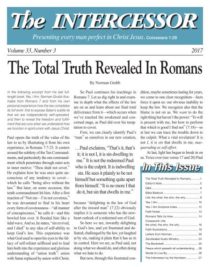
Bible Bedrock
“Through the law I died to the law so that I might live for God.” Galatians 2:19 (New King James)
The law given by God to Moses in its outer written forms, underlining the outer standards of conduct such as the sins of stealing, lying, adultery, murder, malicious destruction of another’s character, is obviously intended to produce outer responses. So it does, and for the simple reason that in our blindness we cannot penetrate into sin at its source, but can only recognize its outer products of committed sins. So the first purpose of the Ten Commandments is to pinpoint our guilt before God and produce in us a realization of His wrath, judgment, and our coming condemnation. This it effectively does by awakening in us “the fear of the Lord, which is the beginning of wisdom.” Most of us were stirred from slumber by some person or event alerting us to the reality of our condition as lost, guilty, and hopeless sinners–unless there be some means of pardon. At such a time we neither considered nor were concerned about our inner sinful condition, but saw only our sins and their fearful aftermath. Verily, for this was the law established–that by it “all the world may become guilty before God.”
Now comes the revelation by Paul of the first deliverance stage of the cross of Christ, the amazing but solid replacement of condemnation by justification, as if the sinner had never sinned–the overplus of grace by the shed blood of His crucified body. Paul speaks of Christ Jesus being “set forth” by God on that historic cross as a public, outward demonstration that He had truly died. That meant that as the penalty of sin is death, so He who “bore our sins in His own body on the tree” really died, having taken our place in death.
But bodily death is but an outer detail. The real meaning of death is not body but spirit destiny: Where do I, an immortal spirit, go? If lost, I shall be among “the spirits in prison”; if saved, among “the spirits of just men made perfect,” Scripture reveals. So Peter proclaimed in his Pentecost speech (using David’s prophecy in Psalm 16) that the Savior went to hell where we were destined to go. But hell could not hold Him, for Satan had no hold on Him, and so His “soul was not left in hell.” But He could not rescue Himself, for He was there representing us in our lost sinnerhood. He was “raised up from the dead by the glory of the Father.”
So through the Lamb’s shed blood, death, and pangs of hell, all that should come to us by way of guilt, condemnation, curse, and uncleanness has disappeared forever for all men. “God was, in Christ, reconciling the world unto Himself, not imputing their trespasses unto them.
—Yes, I Am
by Norman Grubb





